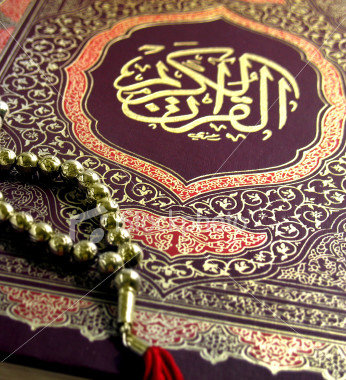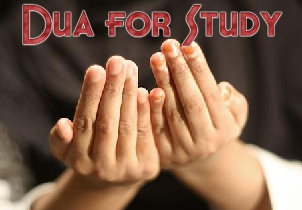Posts Tagged ‘Quran Surah’
- In: All | Allah الله | Islam | Quran
- 1 Comment

The Significance and Tafsir of the Last Two Ayat of Surat Al-Baqarah
Tafsir Ibn Kathir

The Last two Ayah of Surat ul Baqarah
The Messenger (Muhammad ) believes in what has been sent down to him from his Lord, and (so do) the believers. Each one believes in Allâh, His Angels, His Books, and His Messengers. They say,“We make no distinction between one another of His Messengers” – and they say, “We hear, and we obey. (We seek) Your Forgiveness, our Lord, and to You is the return (of all).” (Al-Baqarah 2:285)
Allâh burdens not a person beyond his scope. He gets reward for that (good) which he has earned, and he is punished for that (evil) which he has earned.“Our Lord! Punish us not if we forget or fall into error, our Lord! Lay not on us a burden like that which You did lay on those before us (Jews and Christians); our Lord! Put not on us a burden greater than we have strength to bear. Pardon us and grant us Forgiveness. Have mercy on us. You are our Maulâ (Patron, Suppor-ter and Protector, etc.) and give us victory over the disbelieving people.” (Al-Baqarah 2:286)
The Virtue of These Ayah
From Ibn ‘Abbas ” who said:
“While Jibra’eel (Gibrael) ” `May Peace be upon him’ was sitting with the Prophet !, he heard the opening of a gate above him. So he raised his head and said: `This is a gate from the shies that has opened today, which has never opened before this day.’ So an angel descended from it (the gate). So he Jibra’eel ” said: “This is an angel that has descended to the earth, which has never descended except today. He gave Salam and said: ‘Receive glad tidings [Oh Muhammad ! with two lights which have been given to you, that have never been given to a Prophet before you: The Opening of the Book (i.e. Surat Al- Fatihah) and the end of Surat Al-Baqarah. Never do you read a letter from either of the two (Surahs) except that you are given it.( Which means that you are given its reward (i.e. the reward of recitation)) (Reported by Muslim) (Taken from Mukhtasar Sahih Muslim with Shaykh AI-Albani’s editing, p.553, Hadith no. 2094.)
Tafsir Ibn Kathir
Allah said,
(Each one believes in Allah, His Angels, His Books, and His Messengers. (They say,) “We make no distinction between one another of His Messengers.”)
Therefore, each of the believers believes that Allah is the One and Only and the Sustainer, there is no deity worthy of worship except Him and there is no Lord except Him. The believers also believe in all Allah’s Prophets and Messengers, in the Books that were revealed from heaven to the Messengers and Prophets, who are indeed the servants of Allah. Further, the believers do not differentiate between any of the Prophets, such as, believing in some of them and rejecting others. Rather, all of Allah’s Prophets and Messengers are, to the believers, truthful, righteous, and they were each guided to the path of righteousness, even when some of them bring what abrogates the Law of some others by Allah’s leave. Later on, the Law of Muhammad, the Final Prophet and Messenger from Allah, abrogated all the laws of the Prophets before him. So the Last Hour will commence while Muhammad’s Law remains the only valid Law, and all the while a group of his Ummah will always be on the path of truth, apparent and dominant. Allah’s statement,
(And they say, “We hear, and we obey”) means, we heard Your statement, O our Lord, comprehended and implemented it, and adhered to its implications.
((We seek) Your forgiveness, our Lord) contains a plea and supplication for Allah’s forgiveness, mercy and kindness.
Allah’s statement,
(Allah burdens not a person beyond his scope) means, Allah does not ask a soul what is beyond its ability. This only demonstrates Allah’s kindness, compassion and generosity towards His creation. This Ayah is the Ayah that abrogated the Ayah that worried the Companions, that is, Allah’s statement,
(And whether you disclose what is in yourselves or conceal it, Allah will call you to account for it.)
This indicates that although Allah will question His servants and judge them, He will only punish for what one is able to protect himself from. As for what one cannot protect himself from, such as what one says to himself – or passing thoughts – they will not be punished for that. We should state here that to dislike the evil thoughts that cross one’s mind is a part of faith. Allah said next,
(He gets reward for that which he has earned) of good,
(And he is punished for that which he has earned) of evil, that is, concerning the acts that one is responsible for.
Allah then said, [mentioning what the believers said] while directing His servants to supplicate to Him, all the while promising them that He will answer their supplication:
(“Our Lord! Push us not if we forget or fall into error,”) meaning, “If we forgot an obligation or fell into a prohibition, or made an error while ignorant of its ruling.” We mentioned the Hadith by Abu Hurayrah, that Muslim collected, wherein Allah said, “I shall (accept your supplication).” There is also the Hadith by Ibn `Abbas that Allah said, “I did (accept your supplication).”
(Our Lord! Lay not on us a burden like that which You did lay on those before us (Jews and Christians),) means, “Even if we were able to perform them, do not require us to perform the difficult deeds as You required the previous nations before us, such as the burdens that were placed on them. You sent Your Prophet Muhammad , the Prophet of mercy, to abrogate these burdens through the Law that You revealed to him, the Hanifi (Islamic Monotheism), easy religion.” Muslim recorded that Abu Hurayrah said that the Messenger of Allah said that Allah said, “I shall (accept your supplication).” Ibn `Abbas narrated that the Messenger of Allah said that Allah said, “I did (accept your supplication).” There is the Hadith recorded through various chains of narration that the Messenger of Allah said,
(I was sent with the easy Hanifiyyah way.)
(Our Lord! Put not on us a burden greater than we have strength to bear) of obligations, hardships and afflictions, do not make us bear what we cannot bear of this.
(Our Lord! Put not on us a burden greater than we have strength to bear.)
We mentioned that Allah said, “I shall (accept your supplication)’‘ in one narration, and, “I did (accept your supplication),” in another narration.
(Pardon us) meaning, between us and You regarding what You know of our shortcomings and errors.
(And grant us forgiveness) concerning what is between us and Your servants. So do not expose our errors and evil deeds to them.
(Have mercy on us) in what will come thereafter. Therefore, do not allow us to fall into another error. They say that those who commit error need three things: Allah’s forgiveness for what is between Him and them, that He conceals these errors from His other servants, and thus does not expose them before the servants, and that He grants them immunity from further error.” We mentioned before that Allah answered these pleas, “I shall,” in one narration and, “I did,” in another narration.
(You are our Mawla) meaning, You are our supporter and helper, our trust is in You, You are sought for each and every type of help and our total reliance is on You. There is no power or strength except from You.
(And give us victory over the disbelieving people) those who rejected Your religion, denied Your Oneness, refused the Message of Your Prophet , worshipped other than You and associated others in Your worship. Give us victory and make us prevail above them in this and the Hereafter. Allah said, “I shall,” in one narration, and, “I did,” in the Hadith that Muslim collected from Ibn `Abbas.
Further, Ibn Jarir recorded that Abu Ishaq said that whenever Mu`adh would finish reciting this Surah,
(And give us victory over the disbelieving people), he would say “Amin.”


 [post this Article on your facebook wall,and share with friends.click above “Share” button …]
[post this Article on your facebook wall,and share with friends.click above “Share” button …]


[where ever you post,please add source link.either in website or even in facebook NOTE…please….spread the link of site..]

![]() Note:I’d love to see who visit my website,your views about website. Click here to leave your feedback.
Note:I’d love to see who visit my website,your views about website. Click here to leave your feedback.

- In: All | Allah الله | Islam | Miracles of Allah
- 15 Comments

Question 1: Who are the jinn?
The jinn are among the creatures that Allah (swt) created. Allah (swt) created angels, jinn, mankind, animals, plants and others. Jinn have some qualities like human beings. These qualities are intellect, discrimination, freedom, and the power to choose between right and wrong, between true and false, as well as between good and bad.
Question 2: When did Allah (swt) create the jinn?
Allah (swt) created the jinn before Adam (pbuh) was created. Both were created in heaven and lived in paradise. One may read in Surah Al-Hijr (The Rocky Tract) [Qur’an, 15:26-27]. However, nothing was mentioned about the duration of time of the jinn’s creation before Adam (pbuh).
Question 3: What are jinn created from?
Jinn are created from fire of hot wind [Qur’an, 15:27]; and from smokeless fire [Qur’an, 55:15]. They were originally made from fire and then molded and shaped in the form and shape that Allah (swt) wanted them to be. This means that they do not anymore possess their fiery nature. It is not known therefore, their final shape, form, and chemical composition. Since we cannot see them, therefore, it is not easy to do any analysis of their chemical nature. In contrast, mankind was created from soil, mud, and clay. They were molded as human beings. Our final form is no more mud or clay.
Question 4: Do jinn have bodies?
Yes and no! It depends upon the information that one has. One group of scholars believe that jinn do not have bodies of their own. They also do not inhabit bodies of other creatures. However, they do exist independently by themselves. Therefore, they do not know how they exist without bodies: smoke, flame, fire or what?
The other group of scholars do believe that jinn do have bodies either definite or subtle. If their bodies are definite then they have some density; otherwise, if they are subtle, then they are so fine that our weak eyes cannot see them. One may read Surah Al-A’raf (The Heights) [Qur’an, 7:27]. Even if they are subtle they should have weight and density similar to that of the air itself.
Question 5: Do jinn die?
Yes. Jinn do die. As long as they are creatures created by Allah (swt), they should die. They are creatures that marry, produce children, eat, drink, and die like all other creatures in the universe. One may read Qur’an Surah Al-Rahman (The Most Merciful) [Qur’an, 55:26-28].
Question 6: Do the jinn feel envy of us?
Yes. There are two types of evil eye: human and the jinn. One has to read regularly ‘A’oozu Billahi Minash-shaitanir Rajeem. Also, by reading Ayah Al-Kursi and Al-Mu’awwazatain, one will be protected from the evil eyes of both the jinn and mankind.
Question 7: Are there messengers and prophets from within the community of jinn?
Yes. Allah (swt) has sent prophets and messengers to jinn from within the jinn community. Also, Allah (swt) sent Prophet Muhammad (pbuh) to mankind, to jinn, and to other creatures. In Surah Al-An’am (The Cattle), Allah (swt) explains that He sent messengers to men and to jinn. See Qur’an [6:130].
Question 8: Do jinn have different religions, sects and denominations?
In Surah Al-Jinn (Ch. 72), Allah (swt) informs us that some jinn accepted Islam, while others refused. Those who refused have deviated, and developed for themselves different methods, different ways of life, and different religions, sects and denominations.
Question 9: Do jinn marry and have children?
Yes. Jinn do marry and they do have children. The way they marry is not known to us yet. We may be able to know the future if Allah (swt) wants us to know.
People never knew about microbes, viruses, and the unseen micro creatures. Now we are able to know many things about their life cycles, their life duration, their methods of duplication or reproduction: sexually and asexually. The mere fact that we do not know how the jinn marry and reproduce does not negate their being married and reproduced. The Qur’an stipulates in Surah Al-Kahf (18:50) that they have offsprings. Similarly, the Qur’an states in Surah Al-Rahman (55:56) that jinn and human beings never touched (married) the ladies of paradise.
Question 10: Can human beings and jinn inter-marry?
Yes and no. It depends upon how one looks at it. It is a known fact in the Qur’an in Surah Al-Israa’ (17:64) that jinn may share with us our wealth and our children. The Hadith of the Prophet (pbuh) reconfirms this concept when he says that when a man has marital relationship with his wife, he should mention the name of Allah (swt). He should seek refuge in Allah (swt) from the outcast shaitan. Otherwise, shaitan folds himself up in the man’s urethra and shall have sexual relations along with him.
Moreover, when a man goes to his wife while she is in her menses, shaitan precedes him. She will conceive and will bring forth a sterile person (Mukhannath). Such a sterile person is considered to be child of the jinn.
Question 11: Do jinn have animals as pets?
Yes. Jinn do have animals or beasts of their own. The Prophet (pbuh) mentioned that every piece of dung is fodder for the beasts of the jinn. However, we do not know what type of beasts the jinn have. The same thing is to be said as to the varieties of beasts, their number, their shape, their size, their weight and so on.
Question 12: Do jinn have homes of their own?
Yes. The jinn do have homes. They live all over the planet earth. However, there are special places that one may find them in abundance and on a regular basis. These are deserts, ruins, places of impurities such as dunghills, bathrooms and graveyards. They live in houses of human beings too. For those who enter their houses mentioning the name of Allah (swt), the jinn cannot have a place to stay overnight in that house. If the people of the house mention the name of Allah (swt) before eating, then the shaitan will not be able to eat with them.
Question 13: Is it true that animals see jinn and angels?
Yes. Animals do see angels and shaitan. When a rooster sees an angel, it starts crowing. However, when a donkey starts braying it is seeing a jinn.
- In: All | Allah الله | Islam | Miracles of Allah
- 2 Comments

Allah Says in QURAN :
“We will show them Our signs in all the regions of the earth and in their own souls until they clearly see that this is the truth…” (Surah Fussilat 41:53)
See the Proof below :
Allah Written in SKY – Real Video










































 Oh Allah,Please Forgive me
Oh Allah,Please Forgive me Ex-Christians-Now Muslim,Alhamdulillah
Ex-Christians-Now Muslim,Alhamdulillah I Love My Prophet Muhammad s.a.w
I Love My Prophet Muhammad s.a.w
















![Fake Grave of Prophet Muhammad [pbuh]](https://islamgreatreligion.files.wordpress.com/2009/07/prophet_muhammad_pbuh_tomb4.jpg)


















Recent Comments